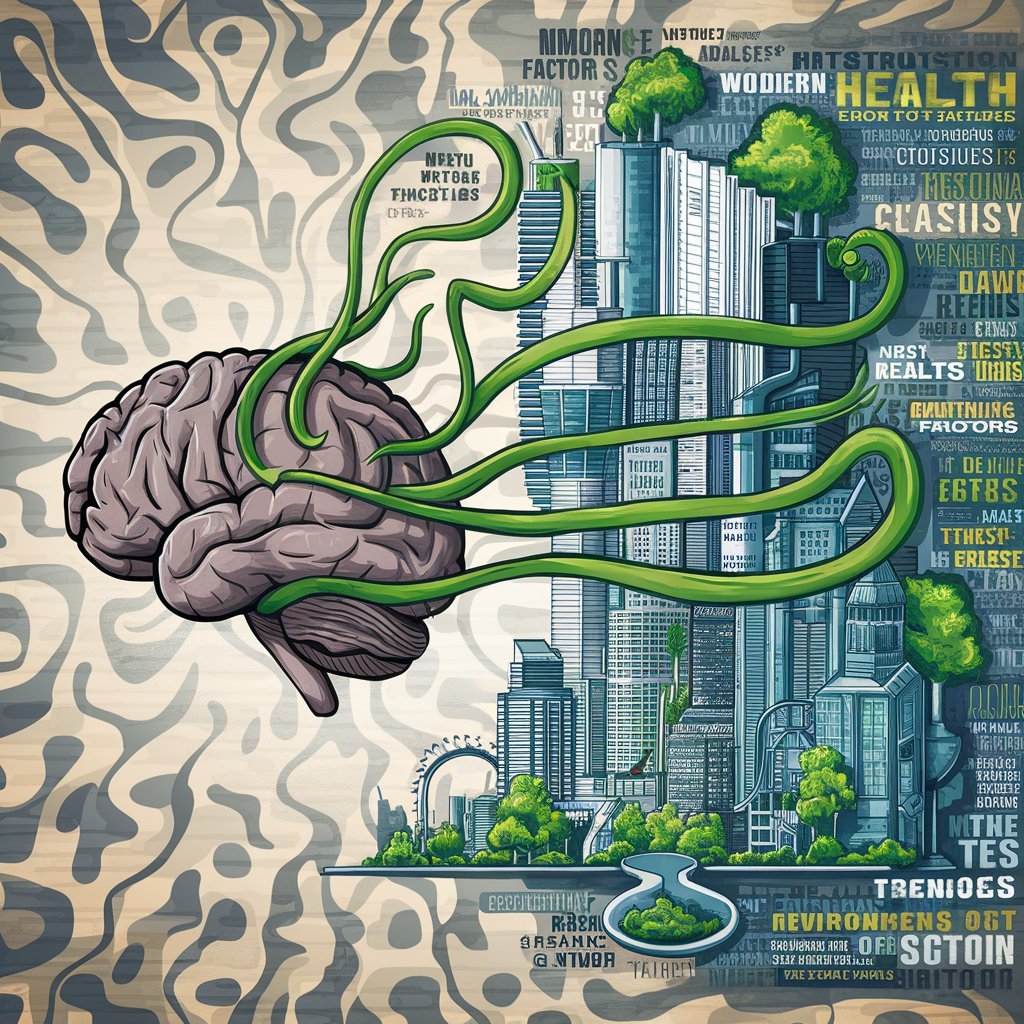Mental Health and Environmental Factors: Understanding the Impact of Our Surroundings in 2024
Hey there, my young and curious friends of 2024! It’s your mental health buddy, Nita Sharda, here to talk about a topic that’s more important than ever in your world – mental health and environmental factors, and how the world around us can impact our well-being and happiness.
Now, I know that the environment you’re growing up in is probably quite different from the one I knew back in 2023. With all the changes and challenges that have happened in the world over the past year, it’s more important than ever to understand how our surroundings can affect our mental health, and what we can do to create a healthier and more supportive environment for ourselves and others.
So today, we’re going to explore the fascinating world of mental health and environmental factors in 2024, and discover some practical strategies and tips for navigating the challenges and opportunities of your unique surroundings.
The Changing Environment of 2024
First, let’s take a moment to imagine what the world around you might look like in 2024, and how it might be impacting your mental health and well-being.
New Challenges and Stressors
I can only imagine the new and complex environmental challenges that have emerged in your world over the past year. Perhaps you’re dealing with:
- The ongoing impacts of climate change, like more frequent and intense natural disasters, rising temperatures and sea levels, or ecosystem disruptions
- New public health crises or pandemics that have emerged, requiring new forms of social distancing, quarantine, or protective measures
- Rapid technological advancements and disruptions, like the increasing use of AI, automation, and virtual reality in daily life, and the challenges of adapting to these changes
- Economic and social inequalities that have been exacerbated by the changing environment, leading to greater stress, anxiety, and uncertainty for many communities
These are just a few examples of the complex and interconnected environmental factors that might be shaping your world in 2024, and impacting your mental health and well-being in new and challenging ways.
New Opportunities and Solutions
At the same time, I imagine that your world of 2024 is also full of new opportunities and solutions for promoting mental health and well-being in the face of environmental challenges.
Perhaps you’re seeing:
- Increased awareness and action around issues like climate justice, public health equity, and digital well-being, with more people working together to create positive change
- New technologies and innovations that are helping to mitigate environmental impacts and support mental health, like green energy solutions, telemedicine platforms, or virtual mental health resources
- Greater emphasis on community resilience and mutual aid, with people coming together to support each other through shared challenges and create a more caring and connected world
- New forms of education and empowerment that are helping young people like you develop the skills and mindsets needed to thrive in a changing environment, like ecological literacy, emotional intelligence, or creative problem-solving
As the world around you continues to shift and evolve, it’s more important than ever to stay attuned to the ways that your environment is impacting your mental health, and to seek out the opportunities and solutions that can help you navigate these challenges with resilience and hope.
Strategies for Promoting Mental Health in a Changing Environment
So, how can you take care of your mental health and well-being in the face of the environmental challenges and opportunities of 2024? Here are a few key strategies to keep in mind:
Cultivate Environmental Awareness
One of the most important things you can do for your mental health in a changing environment is to cultivate a deep and nuanced awareness of the world around you, and how it’s impacting your well-being.
This might involve things like:
- Staying informed about the latest environmental news and trends, and seeking out diverse perspectives and sources of information to gain a more holistic understanding
- Paying attention to your own physical and emotional responses to environmental factors, like changes in weather, air quality, or social dynamics, and learning to recognize and manage these responses
- Developing a sense of connection and stewardship with the natural world around you, whether through outdoor activities, environmental education, or community service projects
- Reflecting on the ways that your own behaviors and choices might be contributing to environmental challenges, and exploring ways to live more sustainably and ethically in alignment with your values
By cultivating this kind of environmental awareness, you can develop a more grounded and empowered sense of your place in the world, and make more informed and intentional choices to support your mental health and well-being.
Foster Social Connection and Support
Another key strategy for promoting mental health in a changing environment is to foster strong and supportive social connections with others who share your experiences and values.
This might involve things like:
- Building relationships with friends, family members, and community members who can offer understanding, encouragement, and practical support in navigating environmental challenges
- Joining or creating social groups or organizations that are working to promote mental health and well-being in the face of environmental factors, like eco-anxiety support groups, community resilience networks, or youth empowerment programs
- Participating in collective action and advocacy efforts that are working to create positive environmental and social change, and feeling a sense of purpose and agency in contributing to these efforts
- Seeking out mental health professionals or other supportive resources when needed, and recognizing that it’s okay to ask for help and support in managing the impacts of environmental stress and trauma
By building a strong and diverse network of social support and connection, you can create a more resilient and adaptive foundation for your mental health and well-being, even in the face of complex environmental challenges.
Practice Mindfulness and Self-Care
In addition to cultivating environmental awareness and social connection, another important strategy for promoting mental health in a changing environment is to practice mindfulness and self-care – that is, taking intentional steps to nurture your own physical, emotional, and spiritual well-being.
This might involve things like:
- Developing a regular mindfulness practice, like meditation, deep breathing, or yoga, to help you stay grounded and present in the face of environmental stress and uncertainty
- Engaging in activities that bring you joy, relaxation, and a sense of flow, like creative hobbies, physical exercise, or time in nature, and making these activities a priority in your daily life
- Practicing self-compassion and self-acceptance, and treating yourself with kindness and understanding when you’re struggling with environmental challenges or setbacks
- Seeking out resources and support for managing specific environmental stressors or traumas, like eco-grief counseling, climate anxiety workbooks, or virtual reality nature therapy
By making mindfulness and self-care a regular part of your routine, you can build greater resilience and adaptability in the face of environmental challenges, and maintain a sense of inner peace and well-being even in the midst of external chaos and change.
Cultivate Hope and Vision
Finally, one of the most powerful things you can do for your mental health in a changing environment is to cultivate a sense of hope and vision for the future – a belief that positive change is possible, and that you have a role to play in creating it.
This might involve things like:
- Seeking out stories and examples of people and communities who are working to create a more just, sustainable, and mentally healthy world, and feeling inspired and motivated by their efforts
- Developing your own sense of purpose and mission in contributing to positive environmental and social change, whether through your career, activism, or personal choices and actions
- Engaging in visioning and goal-setting exercises that help you imagine and work towards a more hopeful and thriving future for yourself and others, even in the face of current challenges and uncertainties
- Cultivating a growth mindset and a sense of agency in the face of environmental challenges, and believing in your own capacity to learn, adapt, and make a difference in the world around you
By nurturing this sense of hope and vision, you can tap into a powerful source of resilience and motivation in the face of environmental challenges, and feel a greater sense of meaning and purpose in your life and work.
A Message of Encouragement and Solidarity
Wow, we’ve explored a lot of big ideas and strategies today, my young friends of 2024! I know that the environmental challenges and opportunities you’re facing can sometimes feel overwhelming, confusing, or even scary, especially as the world around you continues to change and evolve in such rapid and complex ways.
But I want you to know that you are not alone in navigating these challenges, and that you have the strength, creativity, and resilience within you to thrive and make a positive difference in the world, no matter what your environment throws your way.
Remember that your mental health and well-being are precious and valuable, and that you deserve to feel supported, empowered, and hopeful in the face of any environmental stressor or challenge. And know that there are so many people and resources out there who are ready and willing to help you on your journey, and who believe in your capacity to create a better and more mentally healthy world for all.
So keep taking care of yourself and each other, keep seeking out the knowledge and tools you need to navigate your environment with skill and intention, and keep holding onto your vision and hope for a brighter and more













Leave a Reply